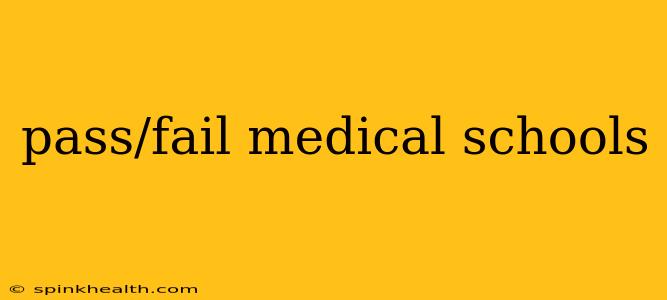The High-Stakes Game: Understanding Pass/Fail in Medical School
The hallowed halls of medical school are a crucible, forging future doctors through years of rigorous study, demanding clinical rotations, and the relentless pressure of high-stakes exams. For many aspiring physicians, the mere mention of "pass/fail" medical schools sends shivers down their spines. Is it a gentler path, or a hidden hazard? Let's delve into the intricacies of this system, separating fact from fiction.
My name is Dr. Evelyn Reed, and for over 15 years I've been involved in medical education, witnessing firsthand the triumphs and challenges faced by students navigating this demanding field. I've seen the impact of different grading systems, and I believe a nuanced understanding is crucial for prospective medical students.
What Does Pass/Fail Actually Mean in Medical School?
Unlike traditional grading systems where numerical scores or letter grades determine academic standing, a pass/fail system simply indicates whether a student has met the minimum competency level required for each course or module. It's a binary system: you either pass and move on, or you fail and may need to repeat the course, potentially impacting your graduation timeline. The specifics vary significantly between institutions and even within different components of the curriculum. Some schools might employ pass/fail for certain foundational science courses, while others might implement it across the board or only for elective subjects.
Are Pass/Fail Medical Schools Easier?
This is a common misconception. While the absence of letter grades might seem less stressful, the reality is that the bar for passing remains exceedingly high. Medical schools, regardless of their grading system, are intensely challenging. A pass/fail system doesn't lower the academic rigor; it simply changes how that rigor is assessed. The pressure to master the material remains immense, driven by the critical nature of the profession. The focus shifts from competing for the highest grades to demonstrating sufficient competency in all areas.
How Do Medical Schools Evaluate Students Without Grades?
If grades aren't used, how do medical schools assess student performance? A multi-faceted approach is typical, using a combination of methods:
- Comprehensive Exams: These high-stakes exams are meticulously designed to evaluate a student's understanding of the material, often encompassing multiple disciplines.
- Clinical Evaluations: Performance in clinical rotations is a significant factor. Attending physicians provide feedback on a student's clinical skills, patient interaction, and problem-solving abilities.
- OSCEs (Objective Structured Clinical Examinations): These standardized assessments provide a structured and objective way to evaluate practical clinical skills.
- Portfolio Development: Some schools incorporate portfolios where students document their learning journey, highlighting projects, research contributions, and reflections on their experiences.
These methods paint a holistic picture of a student's competency, even in the absence of traditional grading.
Does a Pass/Fail System Affect Residency Applications?
This is a crucial question. While residency programs don't have access to letter grades in a pass/fail system, they still scrutinize other aspects of an applicant's record, including:
- USMLE Scores: These standardized medical licensing exams remain central to residency selection.
- Letters of Recommendation: Strong references from attending physicians and professors carry significant weight.
- Research Experience: Publications and research contributions demonstrate intellectual curiosity and dedication.
- Clinical Performance: Evaluations from clinical rotations provide essential insight into a student's clinical capabilities.
Therefore, while the absence of letter grades might alter the application landscape slightly, it doesn't diminish the significance of academic excellence and demonstrable competency.
Are There Any Advantages to Pass/Fail Medical Schools?
Some proponents of pass/fail argue that it reduces anxiety and allows students to focus on mastering the material rather than competing for high grades. It might also encourage students to explore different aspects of medicine without worrying about the impact on their GPA. However, it's essential to remember that the pressure to achieve competency remains intense, irrespective of the grading system.
In conclusion, the pass/fail system in medical school is a complex issue. While it may offer some perceived benefits in reducing grade-related stress, it does not lessen the high expectations and rigorous standards required to become a physician. The focus shifts, but the ultimate goal remains the same: to produce competent and compassionate doctors ready to serve their communities.

